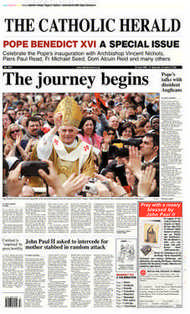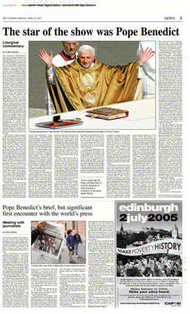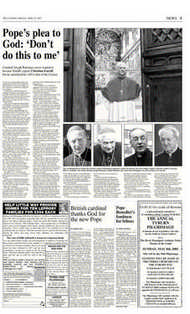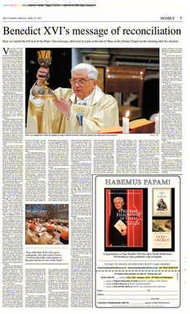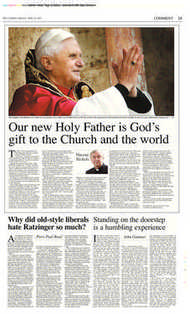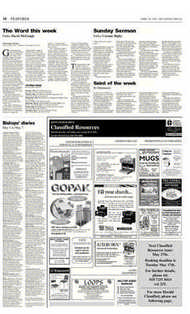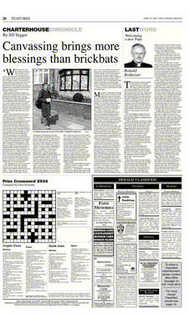Page 13, 29th April 2005
Page 13

Report an error
Noticed an error on this page?If you've noticed an error in this article please click here to report it.
Tags
Share
Related articles
Popebenedictxvi From Feared Doctrinal Enforcer To A Pope...
Letters To The Editor
Reporting On The ‘doctrinal Enforcer’
Exit The Enforcer, Enter The Pope
New Curial Official Attacks ‘stupid’ Tablet
Why did old-style liberals hate Ratzinger so much?
Piers Paul Read
At the beginning of March I was asked by the editor of The Spectator to write an article speculating on who might succeed Pope John Paul II after his death. I protested that I knew little about the potential candidates, but he pressed me and I agreed. The candidate I recommended was Cardinal Joseph Ratzinger. It was less a tip than a prayer.
To explain to younger Catholics why I admired a man who has provoked such hostility, I must take them back to the 1980s, when the winds of change following Vatican II were blowing with the force of a tornado. Pope John XXIII’s concept of aggiornamento was presented by zealots for “the spirit of Vatican II” as a radical agenda incorporating the sovereignty of conscience, liberation theology, conciliarism, women priests, married priests, the reversal of Catholic teaching on the sinfulness of contraception and gay sex, and an ecumenical agenda that repudiated the ruling of Pope Leo XIII that Anglican orders were null and void.
This “alternative magisterium” was vigorously promoted in Catholic journals such as The Tablet; was ubiquitous in Catholic institutions such as Cafod and the Catholic Institute for International Relations (CIIR); and permeated catechetical programmes used in Catholic schools, such as Weaving the Web. It was inherently inconsistent – intolerant of members of Pro Ecclesia et Pontifice or the Latin Mass Society, yet promoting, in the name of conscience, what came to be called “cafeteria Catholicism”.
A remnant of Catholics labelled “conservative” or “traditionalist” who spoke out against this redefinition of the Catholic faith got no support from their bishops: indeed those who despaired of the English bishops and complained to Rome about liturgical innovations or unorthodox teaching were dismissed as “troublemakers”. Any intervention from Rome was resented and the views of Pope John Paul II were discounted as those of a Pole from behind the Iron Curtain who was thought out of touch with modern thinking.
The same could not be said of the theologically erudite Prefect of the Congregation of the Doctrine of the Faith, Cardinal Ratzinger, who, because of his defence of the Church’s established Magisterium, became the bête noire of the self-styled “progressive” Church. I recall going to a meeting in London in 1989 organised by Christian Aid and the CIIR to discuss the rise of “oppressive Christianity” in the Third World. The director of the CIIR described how the aid agencies, by exercising a preferential option for the poor, had produced an effect on Christianity “little short of that of the Protestant Reformation”, but were now facing a counter-Reformation mounted by Right-wing dictators, Protestant sects and – the Vatican! The audience, which included a Catholic bishop, was enthralled. Whenever the name of Cardinal Ratzinger was mentioned, it produced a jeer.
Why was Ratzinger so loathed? A few years before, in 1985, a book had been published called The Ratzinger Report in which the Cardinal had condemned liberation theology as an aspect of “western cultural imperialism‚ and a perversion of biblical tradition”. He had also called to account unorthodox theologians such as Hans Küng and Leonardo Boff.
Cardinal Ratzinger had not just upheld the fundamental tenets of the Catholic faith, he had also seen the danger of compromising with the values of the secular world. “Today more than ever‚” he said in The Ratzinger Report, “the Christian must be aware that he belongs to a minority and that he is in opposition to everything that appears good, obvious, logical to the ‘spirit of the world’, as the New Testament calls it. Among the most urgent tasks facing Christians is that of regaining the capacity of non-conformism – ie the capacity to oppose many developments in the surrounding culture.” It could have been a draft for the speech he delivered to the cardinals before the conclave last week, and his subsequent election as Pope Benedict XVI was surely the endorsement by the Holy Spirit of all he has taught over the past 20 years.
blog comments powered by Disqus


